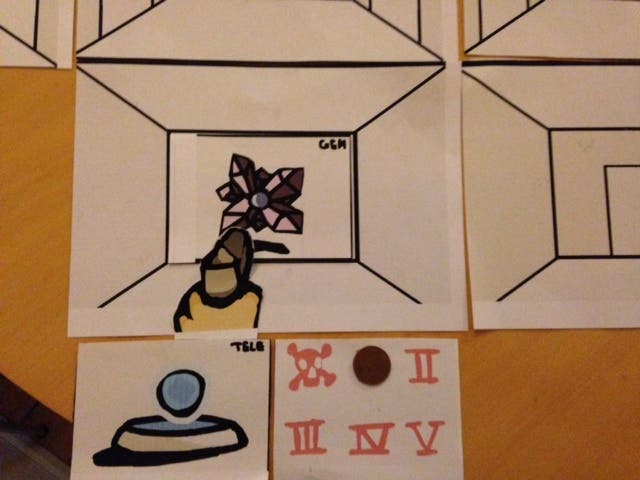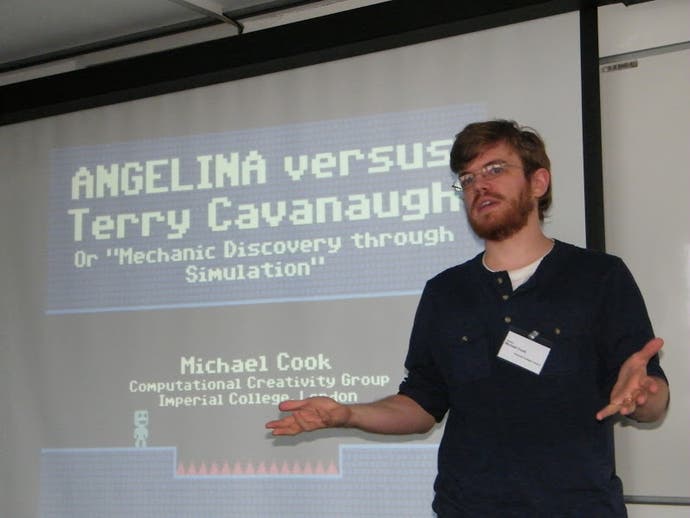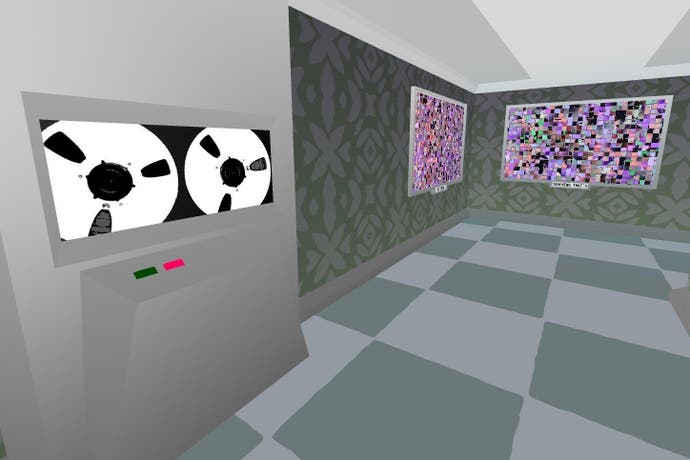Make something that makes something: Inside the Procedural Generation Jam
And why this jam is just the beginning.
Take a few hours off to play these games.
Play Secret Habitat, which dumps you onto a dreamy pastel island studded with nearly 100 art galleries, each of them filled with peculiar one-off paintings and accessed via stair ramps that look like buttresses or spiders' legs. "This process; indescribable, unstoppable," it said to me when I first loaded it up. What will it say to you?
Play Tiny Planets, and simulate whole worlds from their lurid oceans through to their stippled peaks, creating cities that ripple and spread like bacteria. Play Poliparena, "a deadly arena of octopuses armed with swords." Play Colt55: an endless, shifting terrain, a gun in your hand, and a mission: Go make friends with a horse.
If you are ever starting out as a writer, hopefully someone will tell you: write with no attachment to outcome. Here is what that sentiment looks like for games.
Towards the end of 2014, and with a PhD nearing completion, computer scientist Michael Cook was starting to feel like he wanted to destroy things. Luckily, he decided to build things instead. He decided to build things that would, in turn, build other things.
This was not unprecedented. Cook's PhD thesis orbits ANGELINA, an AI game designer he's spent the last few years piecing together. ANGELINA's intriguing, hilarious, and occasionally awe-inspiring. In a circuitous manner, the program was part of the reason he was beginning to feel so frustrated.

Building an AI game designer is vexing work, of course. Most AIs would be incapable of recognising a game, let alone making one. I'm not even sure ANGELINA would recognise games, really. The games that Cook's AI has turned out have the idiosyncrasies you might expect from something that doesn't really understand the full impact of the work it's creating: platformers in which Peter Mandelson's handsome face might appear as you approach a new area, maze adventures in which you collect cross-channel ferries. (Speaking of idiosyncrasies, ANGELINA had other quirks, too: it holds Rupert Murdoch in uncommonly high regard, even though, for a while it exclusively read the Guardian. It navigates and manipulates a world of human language, yet it has little access to the context that human language works within.)
But none of this was the reason for Cook's primary frustrations. Towards the end of last year, Cook was starting to struggle with his own identity as a scientist who worked in territory more traditionally reserved for artists. In fact, he was starting to struggle with an academic identity in general.
"I've had to change my perception of myself and where we draw boundaries a lot lately," laughs Cook when we meet in a coffee shop around the corner from Imperial College, the university where's he's spent the last decade. "I've realised that it's okay to be angry. I've begun to see things that do make me angry, too. And rather than just: well, this is a bit of a bother, I think: no, you know what, this really pisses me off and I would quite like to change some of it."
The biggest example of this comes every year when Cook goes to the AIIDE conference in America. AIIDE stands for Artificial Intelligence and Interactive Digital Entertainment, and it's a place where the mainstream games industry gets together with people from a pure research background. "There's a feeling there that, for scientists to do work that's relevant or important, it should be applicable to what triple-A game development needs," says Cook. "That's how you achieve meaning as a scientist: you solve their problems. We had a talk this year - we kind of have this talk every year, but in a different form from a different speaker - and it was: here's what you're doing wrong as scientists, and here's what you should be doing to help us with your work.
"And it's like, that's kind of adorably patronising. Inevitably what happens is that half the room is sitting there going, yes this is good. The other half is like, didn't we have this talk last year?" Cook laughs. "And the answer is, yes, we did have this talk last year."
And so a lot of Cook's anger comes from the perception that triple-A development is all the games industry is. "The Sims and Destiny, obviously those are interesting parts of the games industry. But that conference is never going to invite Anna Anthropy to give a talk," he says. "It's never going to worry about what the fringe areas of game development are doing. For a while, I've looked at what I do for a job as: I do risky things that aren't commercially viable, because I think they're interesting or because I think they explore new ideas. And then I'm looking at what some of my favourite indies do, which is: things that aren't commercially viable because they push boundaries. I think we're much closer to these people than we are to the people we're desperately trying to please. Why are we worrying about this?"
Luckily, this year, Cook had something more pressing to worry about, anyway. He was worrying about the Procedural Generation Jam, or ProcJam. It's Cook's latest project: a two week game design event that focuses on building things that have a procedural element - things that construct part of the experience algorithmically rather than mathematically. It's not a competition, because nobody wins. There are talks and lots of ideas going back and forth, and everyone just makes something. It's timely stuff, too. Procedural generation is increasingly common in game design: it's how Borderlands assembles its guns, and how Minecraft builds its worlds.
ProcJam took place in November, and lasted nine days, so that participants would have two whole weekends to work with. That's a little more time than most jams give people, and most jams are often a little more prescribed, too. With ProcJam, the theme, beyond procedural generation, was entirely optional, and so was almost everything else. People could make things from scratch, or they could finish off existing projects. Cook didn't even want to limit anyone to just making games. If they wanted to make digital toys or software other creators could use, that was fine as well.
"For whatever reason, and I'm still not sure why, the jam brought together academic researchers, students, indie developers, artists, novice game designers, people who don't think they really have anything to do with games at all," says Cook. "They wanted to make a tool or whatever, fabric generators, quilt pattern generators - and they were all on the same hashtag, talking to each other. And I thought: after all the things I've been angry about, this is exactly what I want, actually."
The end result of all this was, as you might expect, a real range of wonderful oddities. As Cook leads me through some of the finished projects on the ProcJam's homepage, I'm never quite sure what's coming next.
It's generally something astonishing, though. Take The Inquisitor, a procedural murder mystery, offering a different crime to investigate each time you play. "Malcolm Brown, the designer, put so much work into the systems," says Cook. "I have no idea how he actually did so much stuff. There are all of these people across this mansion and you can ask them for motives, what they were doing at the time, where they were. The game pre-simulates this murder, and he just kept adding things. He's added procedural accents and procedural speech impediments."
We wander through a few screens and interrogate our first suspect. "This guy's drunk and so he's slurring all of his words," Cook laughs. "It's taken an existing text and has run a filter over it. This is what I like the most. Generating murder mysteries is really innovative. Generating accents for people is, like, completely out there for me. And I didn't see it coming."
And we move on. A tile generator ("I can't draw a tile as good as this, and he's automatically generating them"), a physics toy called Clump in which blobs of grey stuff swirl and coalesce. Elsewhere, Peregrin generates a walk through a misty forest, Key Geist casts you as a ghost who needs to gather a crowd of random heroes in order to carve a path across a dungeon for you.
"Just the scale of the whole thing surprised me," says Cook, when I ask him what he makes of the jam he's created. "Ludum Dare talks in terms of thousands, which is a big deal. We ended up with 130-odd entries, but I was not expecting that. The jam's pitch was so vague I thought no-one would really want to take part in it."
Looking back, Cook admits that he had two aims. He wanted people who were new to design to just try and make something for the first time, and beyond that he also wanted people to really push the boundaries: to make something new. "I was worried that not enough people would do that, that we'd all kind of make the same thing," he says. "That didn't happen at all, and I got taught so much about the ways that people use procedural generation. I look at these games and I realise I give all these talks where I say: you can use procedural generation for everything and you should use procedural generation for anything you want. And I mean those things from the bottom of my heart. But I'm still shown every day new ideas for how procedural generation can be used - and that's wonderful and humbling."
This is what's struck me, too. Procedural generation, so good at offering regular surprises inside games like Spelunky or Nuclear Throne, is also brilliant at pointing designers in strange directions before the game's even taking shape. As your heroes spin around you in Key Geist, each one a stat enhancement but also a tangible, characterful part of your crew, it really feels like nothing else I've ever played before. A few rows down on the ProcJam website, somebody's made a procedural FPS out of paper. You print the elements out and rearrange them by hand. "This guy mailed me and said, 'Is it okay if I make a procedurally generated table-top game? Does it have to be a video game?'" says Cook. "And I said, 'Look, these things are blowing my mind. You never need to ask permission for something this amazing.'"

Another thing stood out for Cook, too, though - something that may not necessarily be obvious from playing through ProcJam games, but which is making Cook seriously wonder that maybe he hasn't been thinking big enough.
"The other thing that surprised me was collaborations emerging over the course of the week," he says, leaning back. "Originally one of the objectives of ProcJam was going to be: make a generator, but it has to connect to at least one other ProcJam entry. I dropped it in the end because it was too much of a restriction. I might have it as an optional goal next year. But some people actually did it! One person noticed that someone was making a beautiful fabric generator that made all these amazing textures, and they asked, 'Can I use this is my game?' And they started working together. In academia, in game development, people try and force people to work together and it doesn't happen, but these people just did it out of..." He searches for the word. "Out of joy at what they're doing."
That sense of joy has been slow to fade. A few days after ProcJam kicked off, Cook was in Denmark for a conference. "Every hour something would come up and I'd say, 'You know, we don't have to just accept that the way this is. I want to burn it down.' I kept saying: 'I want to burn this down. I want to throw this on the bonfire. I just want to start again.'
"And I want to start again with so many things," he admits. "And I guess going over everything to write my PhD thesis reminded me of everything that had made me angry over the years. Like, why academic publishing is the way it is, why we're so exclusionary. I hosted a workshop at AIIDE, with another guy called Alex Zook, and it was called 'Experimental AI in Games.' It was basically: you know that project you've got on your hard drive that you never told anyone about because you don't know if anyone cares? Submit it here because we care.
"It was amazing. People came forward with stuff they would never have shown anyone. But the thing is I streamed that workshop free for everyone to see, and I don't think I could have done that if I had told the conference sponsors because they wouldn't have let us do it. It's so childish. That kind of thing is so stupid. After a while you think, well, instead of organising this workshop and trying to bend every rule, why don't we just organise our own event?"

Job done. But what comes next?
Cook is an unusual revolutionary, I suspect: an uncommonly polite one, an uncommonly grounded one. A revolutionary with genuine perspective. "I'm so new to this," he tells me. "I realise I'm being very idealistic about the idea that you can change all these systems and stuff, and I know that's a privilege that you get to be idealistic at some point in your life, and eventually it doesn't work out. Or God forbid, it does work out and then you buy into your own hype and you become a monster.
"But I want to do more stuff like this. There was a moment where someone in Denmark was giving a talk about research and how to apply to the games industry. I was giving a talk at the same event and I said: we have to face up to the fact that we are the games industry as well. We don't have to worry about being relevant, because we can be relevant ourselves, just like indie developers found a way to be relevant. I want to start implanting this philosophy in people. I want to give researchers the option to feel like indie developers more than the R&D wing of the games industry. I want them to be able to make stuff that's just cool and maybe doesn't have a wider purpose."
And, after ProcJam, Cook has a very rough idea regarding how he might do that.
"I had one beer in Denmark and I was just talking nonsense," he laughs. "But the dream I discussed was that, somehow, hypothetically, I manage to procure a large amount of money. That's already pushing the limits, I know. Maybe Notch gives it to me. But I would love to set up an institution in London, say, that was just able to offer sabbaticals to developers, researchers, artists, writers. It would say: come and work for six months with whoever else we have in the studio. And just do whatever you want with them. We can fund you. Somehow, 50 percent of that institution's time would be spent making games that either had a research edge or were commercially sellable so that it could fund itself, but the other 50 percent would be, like: just don't worry about writing papers or making money or getting funding from DARPA. Just come and work with whoever else I've managed to convince to come for this six month period. And just meet a new person, find a new idea, and just do something. Don't worry about what comes out of it." He pauses. "I don't know. Too much idealism."
I've met Cook a number of times, and he's always working on something new. That said, I've never seen him so fired up about an idea before. "Someone said to me, 'You're really entrepreneurial,' and I said, 'I'm really not. I'm terrifyingly not,'" he laughs. "There's also another thing. My wife, who is just finishing up her PhD at Imperial as well, we met just as my dad was diagnosed with cancer, and the last eight years for us have just been unbelievable. It just feels like, neither of us go into the office very much, and we work a lot at night. I said to her the other day: 'I think it's because it feels like you're in a nuclear bunker and the whole world's been shut out.'
"She's done so much for me. This is the riskiest stupidest idea I've ever had. I'd never do anything to endanger our lives. But I also feel like, you read these sad comments, from 14 years ago, where people were saying, 'The next generation of games won't be about graphics, they'll be about AI.' It's not that something needs to be done. I think that something can be done. I know a lot of people who have done amazing things. And I feel like, yeah, it would be a terrible shame to see them absorbed and lost forever within the system."
Before I go, it suddenly occurs to me that I never asked what Cook worked on for ProcJam. Did he enter anything? "The short answer is no," he laughs. "I did the day of talks, then I left for Denmark, then three days later I got back, then around Friday I was so stressed and burned out. I tried to enter but I didn't contribute anything."
"Someone said as a joke, though, that the jam was to make something that made something, and I made ProcJam. That's very sweet."
He smiles. "But I still feel like I'd let people down."
To learn more about Michael Cook's work, check out his website.


